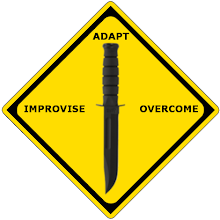Survival ASPECTS OF LEADERSHIP. When dealing with leadership challenges in a survival situation, the foremost weapon a leader must employ is his vigilance: a leader’s attention should be focused on ensuring all people of the group are contributing to the overall success of the situation.
Cohesion. As a leader, you must ensure that all members of the team are working towards the survivability of the group. You can not allow individuals or small groups to formulate their own goals or plan of action.
Self-Worth. A person without self-worth is a person who does not value living. Leadership is a critical; factor in building self-worth. Tasks must be found for each person in which best suits their situation while attempting to receive positive results. (i.e., A man with a broken leg can monitor the fire, A man with a broken arm can still procure water for the group). This will make each and every person feel useful and not a burden to the other members, regardless of their individual situation.
Natural Reactions to Stress. A leader must quickly identify natural reactions to signs of stress his group may be displaying (i.e., Fear, Anxiety, Guilt, Depression). Failure to recognize these signs early will result in injuries, illness, or death which will reduce the groups survival rate. Corrective action must be taken immediately.
Will to Survive. The will to survive is a “mind-set” that must be instilled and reinforced within all members of the group. Without the “will to survive”, no one will succeed.
CONCLUSION. Paramount to survival is preparation and training that will foster trust and confidence in a groups capability to improvise, adapt and overcome in a survival situation. Poorly trained people or groups will not possess the “Will to Survive” as they lack the fundamental skills to overcome the survival situation. Individual confidence is built through challenging and realistic training that teaches a person how to survive and how to effectively use their survival gear and survival skills.
Labels: Psychology, Stress, Survival, Survival Leadership, Survivalism, Survivalists


 Subscribe
Subscribe